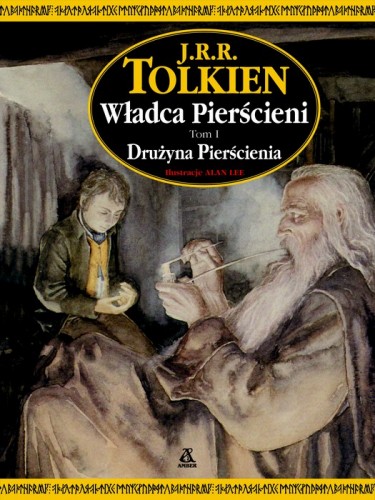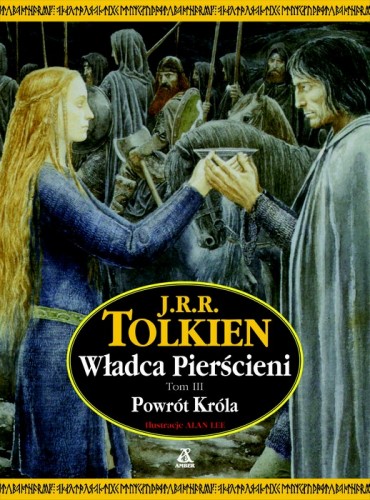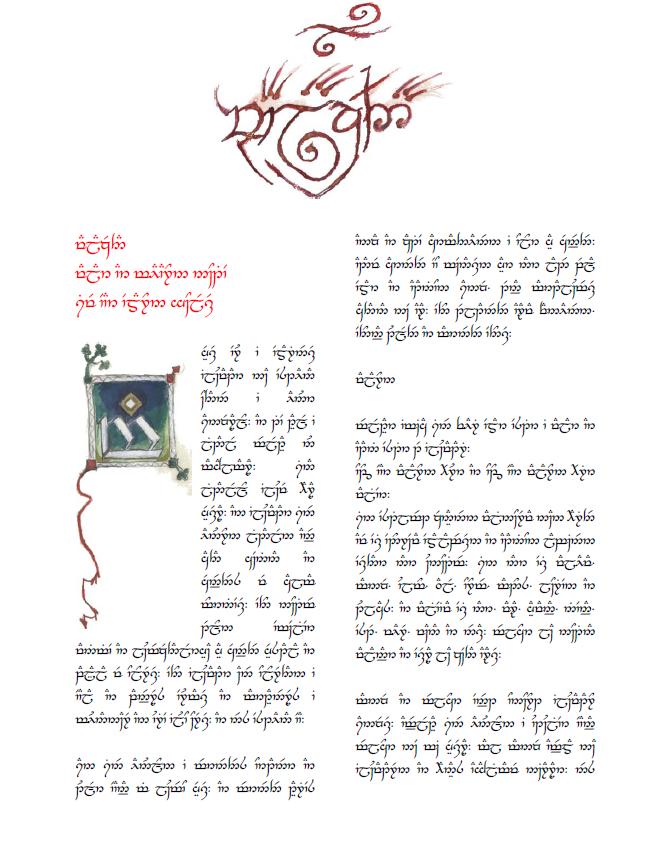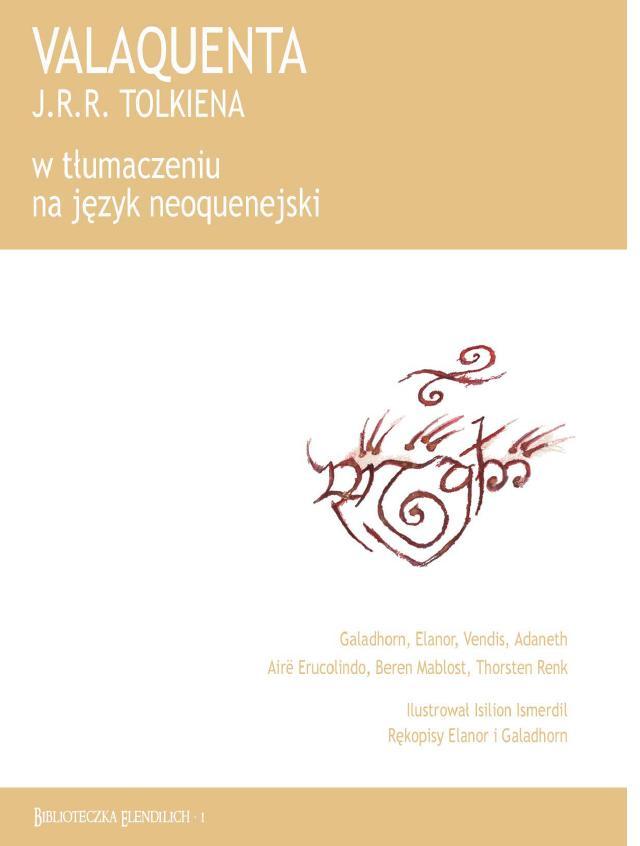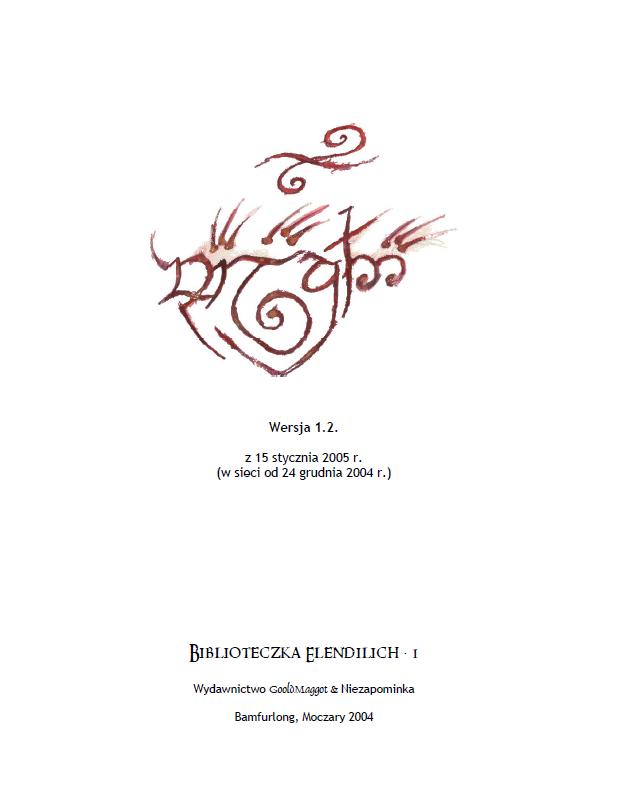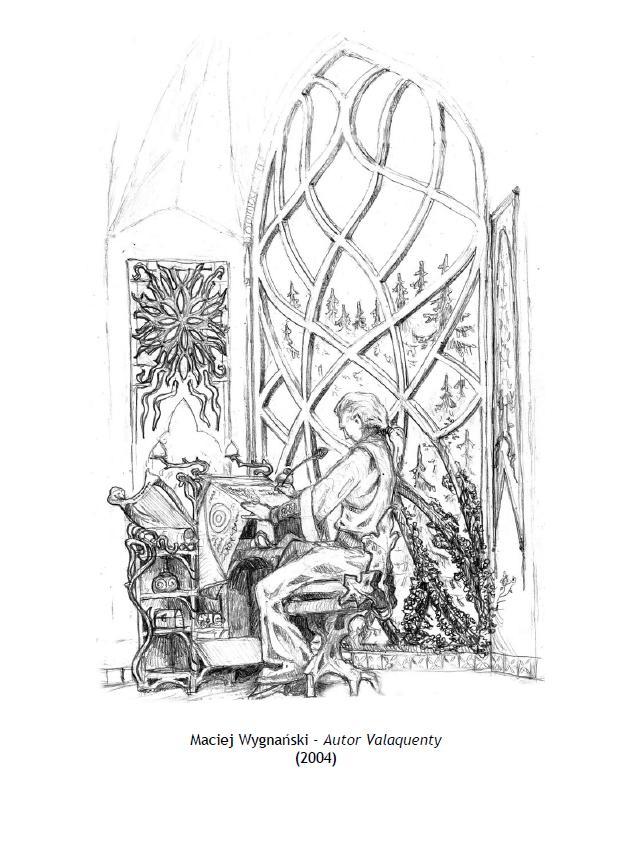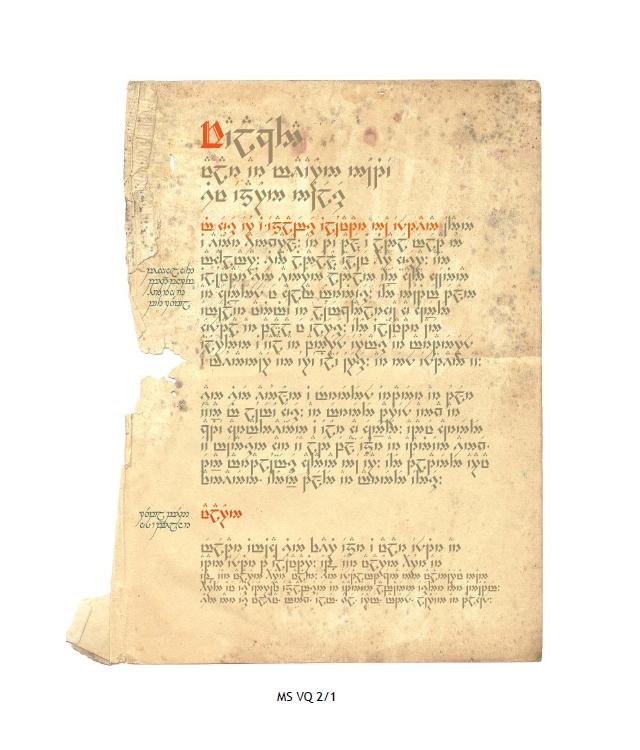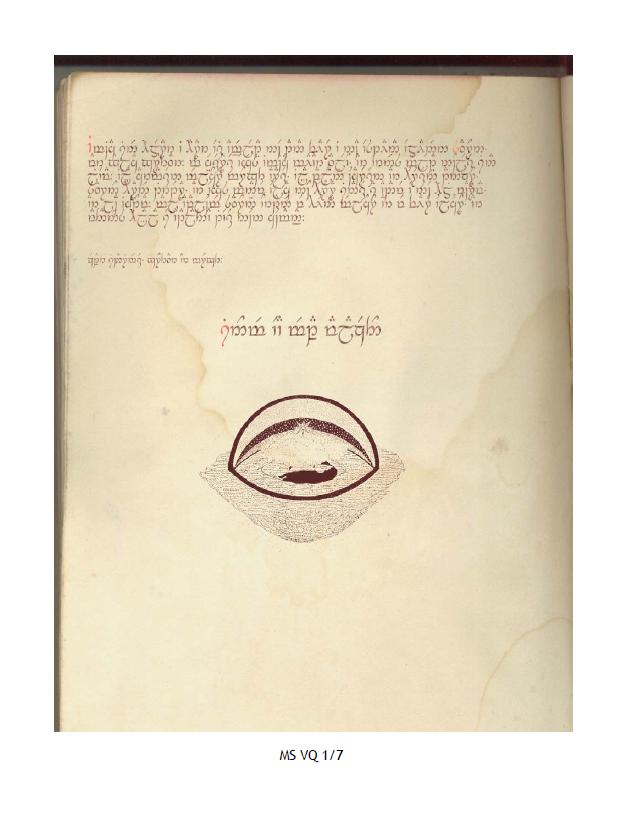Tomasz Strejczyk
O „Władcy Pierścieni ” J. R.R. Tolkiena
To naprawde wspaniała książka napisana poprzez J. Tolkiena, filozofa angielskiego “The Lord of the Rings” i film nakręcony na jej podstawie. Jest to historia wspólnych walk Ludzi i Elfów przeciwko Siłom Ciemności z początków Epoki Żelaza.
Przywódca Zła – Saronman, mówi do Orc’s – swoich siepaczy, wykonawców każdego krwawego rozkazu: “ Byliście kiedyś Elfami, ale Ciemne Siły was pojmały, torturowały, poddały praniu mózgu, aż staliście się Orc’s”. Nie należy sugerować się ich przeraźliwym wyglądem – jest to tylko pokazanie poprzez ich wygląd obrazu ich wnętrza, myśli i gotowości do każdego okrucieństwa.
Z nimi jest sprzymierzona część Ludzi akceptujących Zło, nie zdając sobie sprawy, że wszystcy staną się niewolnikami Saronmana. Wszystko to jest w odniesieniu do obecnych czasów i do tzw. Specialnych Sił. W drugiej części “Dwie Wieże” (czy to jest zbieżność z 9/11 ?), jest wspaniały obraz rozterki Umysłów Ludzkich pomiędzy Dobrem a Złem w postaci dziwacznego stworzenia – Golluma.
Gorąco polecam ten film. Generalnie ani recenzenci ani widzowie za bardzo nie moga doszukac sie tego co chce powiedziec J. Tolkien. Jest to przede wszystkim zacheta do przeciwstawienia sie rzadom Jednostki, przesaczonej zgubnymi ideami i przekonaniami, ze demokracja sie nie spelnia. Błędnie albo celowo utozsamia sie Orc’s z Goblinami. Tak jak ponizej podaje, Orc’s byly kiedys Elfami a teraz sa Mutantami, gotowymi z kazdego zrobic „Squash” na rozkaz swego dowodcy, bez zastanawiania sie i dociekania czy ktos jest winny. Bardziej Krwiozercze sa natomiast Gobliny, wygladajace naprawde przerazliwie ale to jest znowu wyglad bedacy refleksja ich zlych intencji i gotowosci do wykonania kazdej brudnej roboty a nie ich rzeczywisty wyglad. Mozemy je utozsamiac ze wspolczesnymi Specjalnymi Silami do szczegolnych zadan terrorystycznych czy antyterrorystycznych.
Tomasz Strejczyk
STUDIUM LINGWISTYCZNE PISMA ELFÓW
Jest to krótkie opracowanie dotyczące pisma i języka Elfów – czyli Dzieci Światłości tzw. Firstcomming, dla zachęcenia do pogłębienia własnych wiadomości poprzez fachowców i czytelników interesujących się takimi tematami jak i również dla osób uważających, że to wszystko dotyczy tylko “krasnoludków” jeżeli mówi się o książkach J.R.R.Tolkienana, na temat “zagubionych” najwcześniejszych języków Świata.
Tolkien w swoich listach i przedmowie do drugiego wydania książki “ Władca Pierścieni “, podaje, że początkowo zamierzał opracować studium lingwistyczne języka elfów, zbierając na początku XX stulecia w Anglii, mity, legendy, opowiadania ludowe i pieśni z Dawnych Dni, które jeszcze się zachowały w pamięci ludu angielskiego zamieszkującego wioski i miasteczka w rejonie Warwick, nie zatrutego jeszcze pośpiechem i nowoczesnością.
Polecam „gorąco” książki Tolkiena, które powiedzą znacznie więcej o tych przekazach, jak „Silmarillion” , „Niedokończone Opowieści” czy „Księga Zaginionych Opowieści” w której są wszystkie informacje na temat rękopisów spisanych w języku Elfów, z których korzystał Tolkien. Korzystał również z przekazów i zachowanych pieśni ludowych w języku staroangielskim, którym jeszcze Elfy które zostały w tzw. Śródziemiu porozumiewały się z ludźmi.
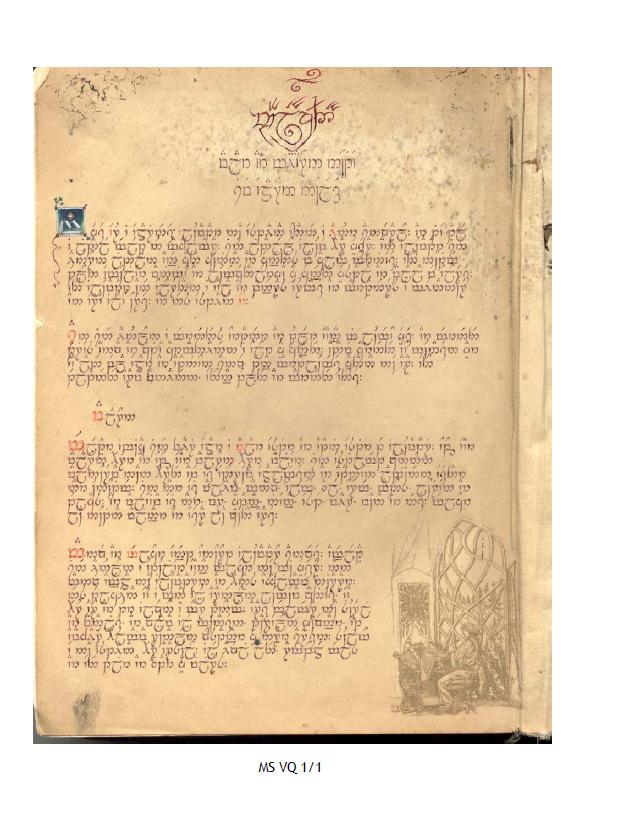 Valaquenta fascimile Rękopisów
Valaquenta fascimile Rękopisów
Podstawowy alfabet pisma Elfów – nazywa się Tengwar do pisania piórem lub pędzelkiem a jego kanciasta forma ryta w metalach , kamieniach, drewnie, cegle nazywa się Cirth czyli Kirth. Później z Kirth Secondcomming czyli śmiertelni już ludzie wykształcili własne formy pisma runicznego a z Tengwaru własne alfabety. Jak się uważnie przyjrzymy np. alfabetowi hinduskiemu czy hebrajskiemu, to styl czy tzw. krój pisma jest zbliżony czy podobny do Tengwaru.
Starożytna irlandzka literatura mitologiczna w jednym z zachowanych z ogólnego niszczenia poprzez fanatycznych misjonarzy wszystkich przekazów z Dawnych Dni, rękopisie tzw.“Wurzburg Codex” z około 700 r. n.e., znajdującym się w Muzeum w Edynburgu podaje, że Elfowie to bohaterska, królewska i bogom podobna rasa nadludzko pięknych i mądrych istot. Czynem niesamowitego barbarzyńskiego zniszczenia wszystkich archiwów i pism starożytnych, było spalenie biblioteki Aleksandryjskiej w 500 roku n.e. poprzez fanatyczny tłum judo-chrześcijański.
Tolkien dosłownie w ostatnim momencie uratował przed zniszczeniem i zapomnieniem te bezcenne przekazy, rękopisy i dane z Dawnych Dni. Nie znalazły one należytego zrozumienia i propagatora, ponieważ podważyłyby wiele dotychczasowych mitów, pojęć i teorii. Tolkien nie chcąc narazić swojej kariery oksfordzkiego profesora, używał słowa invention od łacińskiego słowa invenire, oznaczającego – znaleźć lub odkryć w jego najstarszej formie, pozwalającego Tolkienowi w ten sposób podkreślić dużą prawdziwość jego twórczości, a co przeważnie jest interpretowane, że to wszystko jest fantazją – czy wymyśloną historią.
Np. w j. staroangielskim, słowo Elfscyne oznaczało komplement dla kobiety – oznaczało, że jest piękna jak kobieta Elfów. Wielu znanych pisarzy uważa, że we wszystkich literaturach od czasu powstania Świętych Ksiąg Ludzkości nie ma Mitu Stworzenia Świata, który dorównywałby pod względem piękna i wyobraźni Mitowi zawartemu w Silmarillion.
Kolejnym ciosem dla przeciwników Kronik Dawnych Dni jest archeologiczne odkrycie 7 szkieletów Hobbitów sprzed co najmniej 18 tys. lat ( aż do 95 tys. lat) na wyspie Flores w Indonezji. Ich wzrost wynosił około 3 i pół stopy co jest zgodne z Kronikami Tolkiena. Podaje to Magazyn “National Geographic” i Gazeta “Toronto Star” z 28 Października 2004 roku. Obecnie znalezisk jest więcej.
Wszystkie wyczerpujące informacje na temat alfabetów i języków używanych poprzez Elfy znajdziecie Państwo np. w Dodatku E 3 tomu książki “ Władca Pierścieni “ J.R.R. Tolkiena
Bibliography: “Tolkien: A look Behind “The Lord of the Rings” by Lin Carter
“The Road to Middle – Earth” by T.A. Shippey and “Letters” by Christopher Tolkien
Valaquenta
„Valaquenta stanowi jeden z początkowych tekstów opublikowanego Silmarillionu
i jest pięknym opisem mocy rządzących światem – Eru i jego „aniołów”: Valarów i Maiarów, ale również Nieprzyjaciela i jego sługi. Bogactwo języka, piękne opisy oraz duża ilość quenejskiej nomenklatury to wspaniałe wyzwanie dla nas – fascynatów lingwistycznej strony twórczości Tolkiena.”
„Christopher Tolkien twierdzi (IV 274), że pierwowzorem postaci Pengolodha był Gilfanon z Tavrobel, znany z najwcześniejszej wersji legendarium – Ksiąg Zaginionych Opowieści (HoMe I i II). Gilfanon mieszkał na wyspie Tol Eressëa w miejscowości Tavrobel2, a jego siedzibę nazywano Domem Stu Kominów3. Zatrzymał się u niego Eriol (zwany też Elfwine), któremu mędrzec nakazał spisać wszystko, co ów zabłąkany Anglik usłyszał o historii Elfów. Gilfanon był Elfem z Kôr, „zaprawdę jednym z najstarszych przedstawicieli czarodziejskiego ludu (ang. fairies) i najbardziej sędziwym z tych, którzy dziś żyją na wyspie”.
W „Annałach Valinoru” („Annals of Valinor”, w skrócie AV) z roku 1930 spotykamy Pengoloda Uczonego z Gondolinu, który zamieszkał w Tavrobel na wyspie Tol Eressëa. Ponieważ i do niego udał się wspomniany wyżej Eriol-Ælfwine i przetłumaczył tam na staroangielski jego księgę, podejrzewać możemy, że doszło tu do zwykłego zastąpienia
starszego imienia nowym: Gilfanon > Pengolod.
Różnica między tymi dwiema postaciami polega na tym, że Gilfanon pochodził z plemienia Gnomów – Noldoli, ale nie miał żadnych związków z Gondolinem. Tymczasem Pengolod urodził się w Valinorze, ale później znalazł się w Śródziemiu i wreszcie „powrócił” – jak czytamy w AV – na Najdalszy Zachód. W Śródziemiu zamieszkiwał w Gondolinie, a po jego upadku w Przystani Sirionu, skąd udał się na Tol Eressëa (IV 263).
Zarówno wersja „Annałów Valinoru” z roku 1930 (AV 1), jak i ta, która powstała około roku 1937 (AV 2), są w zamierzeniu Tolkiena po części dziełem Pengoloda / Pengoloða (my pozostaniemy przy wersji Pengolodh). Pengolodh jest redaktorem AV 2 i uzupełnia oryginalny tekst Rúmila własnymi komentarzami – jest zatem kontynuatorem pracy Rúmila
(V 122).
Około roku 1937 Tolkien przypisuje Pengolodhowi kolejne swoje dzieło, a w zasadzie serię pism lingwistycznych, czyli „Lhammas A”, „Lhammas B” i „Lammasethen”. Tym samym postać mędrca ewoluuje ku najsłynniejszemu językoznawcy Dawnych Dni. Teraz Pengolodh staje się największym autorytetem w dziedzinie lingwistyki Ardy. Widzimy, że orientuje się on znakomicie nie tylko w tematyce języków Elfów, ale również języków Ludzi i innych mówiących stworzeń swojego świata.
Na przełomie lat 1937/1938 powstaje kolejne ujęcie legend dawnych dni, zatytułowane Quenta Silmarillion. I to dzieło przypisuje Profesor Tolkien naszemu Pengolodhowi. Wraz z Annałami Valinoru i zapewne też Annałami Beleriandu oraz Lhammas, które omówiłem powyżej, Quenta Silmarillion stanowiła zbiór pism Pengolodha z Gondolinu. Jego dzieło
miał przetłumaczyć na staroangielski średniowieczny marynarz Ælfwine. Strona tytułowa Quenta Silmarillion wygląda następująco:
Quenta Silmarillion
Oto
Qenta Noldorinwa czyli Pennas inGeleidh
albo
Historia Gnomów
Jest to historia, w której streszczono wiele starszych opowieści […]. Relację tę spisał wpierw Pengolod z Gondolinu, a Ælfwine przełożył ją na mowę swoich czasów, nie dodając nic – jako rzecze – prócz wyjaśnień kilku imion.
Dalej czytamy, że historie te spisał Pengolod Uczony z Gondolinu, tak w tym mieście, przed jego upadkiem, jak i później, w Tathrobel na Samotnej Wyspie, Toleressëa, po powrocie na Zachód (LR 203). Przy kompilacji dzieła miał Pengolodh korzystać z pism Rúmila z Valinoru.”
„Właściwie wszystko co wiemy dziś o nazewnictwie wśród Elfów i o początkach języków eldarińskich oraz o poglądach innych uczonych na te sprawy, wiemy wprost lub pośrednio od Pengolodha. Zanim upadł Morgoth i zatonął Beleriand, Pengolodh zebrał wiele materiału lingwistycznego. Przeżył on katastrofę końca Pierwszej Ery i pozostał w Śródziemiu przez wiele lat Drugiej Ery. Dążył do jak najpełniejszego poznania języków Ardy, wiele podróżował po Eriadorze, zamieszkał nawet wśród Krasnoludów z Casarrondo (Khazadd _m). W tym czasie stworzył dzieło swego życia – Lammas czyli ‘Opis Języków’, w którym zawarł całą swoją wiedzę o mowie Elfów, Ludzi i Krasnoludów, jak również – korzystając z rękopisu I Equessi Rúmilo – o Valarach. Pengolodh był również znakomitym kronikarzem i historykiem. Napisał Inias Beleriand czyli Annały Beleriandu, w których zapisał wydarzenia Dawnych Dni. Być może to on również był autorem Quenta Silmarillion czyli ‘Historii Silmarilów’.”
„A oto nasza apokryficzna opowieść, która wyjaśnia jak dokument z Dawnych Dni dostał się w nasze ręce. Jest to relacja angielskich i szkockich uczonych z XX w. Znalezione rękopisy pochodzą prawdopodobnie z II i IV Ery. Są dziełem
elfickich (?) kopistów. Rękopis opisany przez Elanor jest niewątpliwie dziełem elfów z Imladris (MS VQ 1 – powstałym w IV erze), natomiast fragmenty rękopisu opisanego przez Galadhorna powstały w środowisku związanym z jeszcze z
Celebrimborem i bractwem Gwaith-i-Mírdain (MS VQ 2 – w II erze). Styl pisma na marginaliach MS VQ 2 przypomina styl pisma samego Celebrimbora, jednak brak dowodów na to, że to on był komentatorem. Natomiast tekst główny zapisany jest wydłużoną pionowo minuskułą noldorską. Rękopis MS VQ 2 przez długi czas znajdował się w bibliotece Elronda w Imladris, a potem zawędrował do Minas Tirith (być może w czasach króla Eldariona, syna Aragorna Elessara). Ciekawy jest materiał, z którego wykonano księgę. Mamy bowiem do czynienia z rodzajem bardzo trwałego papieru, który prawdopodobnie pochodził z manufaktury w Lórien i wykonany jest z drewna i liści mallornów.
Nie znamy dalszych losów dokumentów. Pojawiają się one znowu w latach 20. XX w., gdy w jednym z antykwariatów w Edynburgu znajduje te karty pewna kolekcjonerka starożytności. Wraz z grupą studentów i pracowników naukowych
z Uniwersytetu Edynburskiego prowadzi ona badania, kontaktuje się z profesorem z Leeds, młodym Tolkienem. W ten sposób o treści „Valaquenty” dowiaduje się pracujący od dawna nad rękopisem Czerwonej Księgi przyszły
autor „Władcy Pierścieni.”
Valaquenta – Macieja Wygnańskiego [pdf. – do pobrania]
Language Elvfes
Words Remembered
| The words in this list attempt to define languages that are much more feeling-based than English. Use the definitions as a guide but not as a hard and fast rule. The definitions more give you a feel of what the words mean. | |
| What were the original elven lands called? | |
| Finding an otherkin Name | |
| And now on to the word list, such as it is so far. | |
| General Notes: | |
| The suffix of „ai” as in Des’tai implies a state of being that lasts indefinitely. The suffix „ar” as in „senar” implies a state of being that is in the present, and temporary. There is no specific verb which meant „to be”. There are no specific pronouns for he, she, etc. These things are implied. The suffix „-ka” lends to the word a sense of being a thing of the Soul, it takes a word or reference and implies more than a simple choosing, it implies a sense that this is a thing so much a part of oneself or one’s destiny… I am not sure how to explain it. It’s like the difference between a mate, and a Soul-Mate, if that makes sense. |
| Elven | English | Origin |
| ‚A | Of | Shiri |
| Achabe | Spreading | Shiri |
| Acheyla | An informal „hello” that comes from a longer, formal greeting (see Harani a’kaheyla de’shanuay”). Also, greeting a friend during times of trouble. | Alloryen |
| Adrastai | Scouts — A note on the Adrastai…though technically scouts, I tend to associate them more with knights, viz-a-viz King Arthur, et al, due to their extreme loyalty and dedication to the crown, than I do with any sort of ranger archetype. | Tulari |
| Aidan | Little flame | Gaelic |
| A’Laena Sar | Until we Meet Again | Lis’tarii |
| Alardan | A gathering of one or more tribes of otherkin | Miaren |
| Ali Sanar | I am missing you (connotations of I am missing your light) | Yyl’Nectaar |
| Allien | Those who are bodily | Lis’tarii |
| Ama | Blood | Shiri |
| Amache | Laying low (defeating) | Shiri |
| Ame | Or | Shiri |
| Amonta de’ Toya” (A-mon-tah Dee Toy-ah) | Loosly translated: „GOD(DESS) DAMN IT!” As you may have guessed it’s usually not a happy elf who says this. Though most of the „lighter” elves are rather happy, that’s why you’ll usually find the dark and the occational toxic elf expressing themselves in this way. | Lyn’eun, Dark Elf |
| aNAlalai | Danger | Amanjaku |
| Anda | Color | Shiri |
| Aqofeltu | Forgetfulness | Silver Elves |
| Aranthi | White, 5 petaled flower that smells like honey | Shiri |
| Araste Makatar Nih | He who lives by the sword shall die by the sword, bringing oceans of tears in weeping | Lis’tarii |
| Arianai | You’re wicked 😉 | Lis’tarii |
| Arias’tama | Bad Ass | The Tir |
| Ashan’rai | Son of the High King | Tulari |
| Asha | Spirit | Shiri |
| Ashtae | The Area Around. Between. In the Area of | Lis’tarii |
| Astarii | Several races of starborn beings….not from the stars but created of them. | Unknown Elven |
| Aut, Yanna Senar | Oh my nads (female) are desirous | Tulari |
| Ave | Now | Shiri |
| Barith | Seas of Chance | Lis’tarii |
| Basan (bay-sane) | Sorrow | Silver Elves |
| Beliana | Day | Yyl’Nectaar |
| Besove | Charging | Shiri |
| Bochara | Victor | Shiri |
| Ceshar | Informal word meaning goodbye, but implying that we part a friends and will meet again. The Elven equivalent of „See ya later.” | Alloryen |
| Ceshtanen | Erased completely | Tulari |
| Chairen | A group of individuals working in concert, either through a Draelren or more conventional methods, to heal an individual | Tulari |
| Chev | Suffix meaning „beloved,” used to refer to lifemates | The Tir |
| Chura | (Your) female fluids. Very rude: the more decorous term is „nectar” | Shiri |
| Clarash | A musical instrument like a small harp | Alloryen |
| Daia Dadu Da | Let All Stand Against Shadow (A battle Cry) | Firefen, Melendil |
| Dan | South | Shiri |
| Dan | Proper, traditional | Shiri |
| Dara/daro | Aunt/uncle | Shiri |
| Deea Canayen | A yearly calendar | Firefen, Melendil |
| Demii | Astral equivalent of a Siamese cat. plural: demiie | Shiri |
| Den’shrai | Thank you for help. It is connected with Des’tai, and has the connotation of „thank you for helping me on my path”. | Tulari |
| Der | Soul – (pronounced dear) | Silver Elves |
| Derzorvadur | Soul infusion | Silver Elves |
| Des’eren (desh-er-en) | Well met, connotation of Des’tai | Tulari |
| Desh’nerain | Brother | The Tir |
| Desh’iriai | Sister | The Tir |
| Desh’ketai | Father | The Tir |
| Desh’mieve | Mother | The Tir |
| Desh’miriai | Guardian, bodyguard of a household | The Tir |
| Des’tai | Honorable/Walking one’s path | Tulari |
| Deyash nek’tai | Walk with me | Tulari |
| Dorai | Love/duty to loved ones | Tulari |
| Doulgen’ra | A Draelren with the intent of traveling to a specific location, or of exploring | Tulari |
| Drachlande | „Rocky/austere land” – Listarii home | Lis’tarii |
| Draelond | „Deep Harbor” | Lis’tarii |
| Draels’tai | A group of individuals entering the spirit realm in concert | Tulari |
| Draelren | The process of entering the spirit realm as part of a Draels’tai | Tulari |
| E | The | Shiri |
| Ea | The All, The Creator (See Iri’A) | Tolkien |
| Easaahae | Peace | Lis’tarii |
| Echye | Coward | Shiri |
| Ederoi | Angels | Shiri |
| Ehiela | Devoted | Shiri |
| Eisha’miai | Some sort of elven spirit-sickness, not quite sure here | The Tir |
| Ekahal | Wizard | Shiri |
| Ekahua | Sorceress and advisor | Shiri |
| Ekahuei | Wizard and advisor | Shiri |
| Ekar/a | Master/mistress (implies skill and control) | Shiri |
| El’ | Used in a name, meaning „of” or „from” | Alloryen |
| Ela | Stars | Shiri |
| éla | It | Shiri |
| Elashta-shiri | Heavenly Tribe, the Tuatha de Danaan, ancestors of the Court | Shiri |
| Ela-Ishtel | Star Palace; the sky, also refers to a cosmological concept linking elves to stars and the „Star Palace” to a homeland or paradise | Shiri |
| Elen | Although Tolkein translates this as „elf/of the stars”, it is in our tongue „elf and friend”. | Tulari |
| Elenari | Plural of Elf and Friend. Alternatively, Star Elf (the contraction of eleni (star) and ri (elf). Alternatively, contract elen (star) and ar’i (day) to get Starday. | Tulari |
| Elia | Soul or Spirit; Can also be a proper name | The Tir |
| Eliai’iriai | Soul-sister | The Tir |
| Eliai’nerain | Soul-brother | The Tir |
| Eluana | Female name | Tulari |
| Elvaleryn | Physical immortality | Silver Elves |
| Embave | Resting (also imperative: rest!) | Shiri |
| Emme | Four | Shiri |
| Enai | Endures, withstands | Shiri |
| Enaerson | „Right there” – sexual connotation | Lis’tarii |
| Eng | Me | Shiri |
| Enrai | High King — A literal translation would be „The first one”, as in the first among equals. Note: Words like Enrai, that are short, often imply a great many things that would take up a few paragraphs in English, and even then you have to have an elven mindset with all the linked ideas to the word to get it. In other words, do not let the apparent simplicity of the definitions mislead you. | Tulari |
| Enta | You hear me | Tulari |
| Era | Earth (world?) | Yyl’Nectaar |
| Era Katana | „Earth Land” | Yyl’Nectaar |
| Ereiash’demaa | Badass | The Tir |
| Ereiash’demaa na Enrai | Bad Ass to the High King | The Tir |
| Eren’rai | Daughter of the King | Tulari |
| Eshai’du | Colloquially „dumbass;” more likely „ignorant” | The Tir |
| Eshe | Friend, especially in the sense of trusted ally | Shiri |
| Esiai’desh’mirain | A noble bodyguard | The Tir |
| Estai | Wrath, anger | Shiri |
| Evala | Cloak | Shiri |
| Evrantilen | Oath-sworn, (noun, plural) | Tulari |
| Fai | Huh? | Shiri |
| Farth (fairth) | Fae — This word is used to mean all otherkind. | Silver Elves |
| Faladar (fail-la-dare) | A sense of something impending…. either something about to happen or something that needs to be done. | Silver Elves |
| Feas | Love or like of an inanimate object, as I really love that car or movie | Silver Elves |
| Feln (feel-n) | A love that elves have particularly for other elves or things elfin and this perhaps is closest to what you mean by Elven Love. | Silver Elves |
| Fin | Air | Shiri |
| Fylorn (fill-lorn) | The word for empathy | Silver Elves |
| Ford (like the car) | Love of a soul mate or best friend or family | Silver Elves |
| Galadhad | Trees | Tolkien |
| Gale | Staining | Shiri |
| Gar | Proficient? | Shiri |
| Gaya | Hear this (formal) | Shiri |
| Gieran | Beloved brother (said as Geahren has a bitter connotation) | Tulari |
| Gil-Enrai | Champion of the King | Tulari |
| Glora | Sun | Shiri |
| Gwai | Sky | Alloryen |
| Gwairoch | Pegasus or Skyhorse | Alloryen |
| Hae Hanae-Sa | See the way | Lis’tarii |
| Hal | Festival day | Shiri |
| Halae-Han | Walk the water | Lis’tarii |
| Hanae-so, hanie-ho-so | Singer of the way | Lis’tarii |
| Harani A’kaheyla de’shanuay”. | I am honored/blessed to greet you/walk with you on your path” or something similar. | Alloryen |
| Helath | The Paths or Tapestry of Worlds | Lis’tarii |
| Hole Asin | Child of the Fae – Fae child | Lis’tarii |
| Ias | Formal House, as in Household or Clan | Yyl’Nectaar |
| Iasa | Head of the household or „father” | Yyl’Nectaar |
| Iasatar | Thank you, be it known I thank you (Sata in this case means „Know”) | Yyl’Nectaar |
| Iri’A | The One Force; the creative force behind all things, very much akin to the Force in the Star Wars trilogy | The Tir |
| Iriv’teshai | War-companion; The equivalent of the mortal term „buddy” in Vietnam | The Tir |
| I Satanas | I Know | Yyl’Nectaar |
| Ishmaen | A wizard (not of light) – Used as a slur | Firefen, Melendil |
| Jalar (jay-lair) | Divine love or a feeling of oneness or unity with all | Silver Elves |
| Janda’hai | Round-Ears — referred to an apelike species of creatures | Drae’stari |
| Ja nevnay | An oath, roughly translating to ‚velvet sky’, most often used when thorougly exasperated with someone/thing. I think it’s a refernce to the star goddess, because that seems to be the only reasonable one I can think of | Alloryen |
| Jiach’ar | A Draelren with the attent of striking at an individual, spirit or magical construct | Tulari |
| Kai’ | Female honorific prefix to a given name (Kai’Laria) | The Tir |
| Kaldar-maaren | Shadow-born — Also called dark men — They have no bodies, but they use those of living beings if the will is weak or someone has prepared the way for them by other means. Even then the body gradually fades into the darkness of it’s possessor…so they must seek new hosts constantly. | Lyran |
| Kaleanae | Observer, Watcher | Lis’tarii |
| Katamah! | Look at the higher soul or self (reach for the stars) to improve oneself | Fierfen, Melendil |
| Katar Neenar | Spiritual father, wise teacher of spiritual heritage of the people like a priest of some sort. Alternate meaning – „No idea, don’t know at all” | Firefen, Melendil |
| Katinar | Proper name meaning „kitten”. | The Tir |
| Ke’ | Male honorific prefix to a given name (Ke’Ninaste, for instance) | The Tir |
| Keh? | What? | Tulari |
| Keroth | brother | Unknown Elven |
| Keth’enai, to ma na’ei! | My brethren, in my heart | Unknown Elven |
| khul’Shalkrum | Living Weapon | Crytes |
| Kieran | Beloved sister | Tulari |
| Ki’Leana | Female name. The „Ki” part means spirit fury. Leana means something like „dedicated or in service to”. Ki’Leana could then mean something like „Dedicated to spirit fury”. | Tulari |
| Kiyana | Kind of like an angry exclamation word….something to do with expressing spirit fury. (Note: this word and definition were given to us by a person who had never seen this list or the above definition!) | Nanine |
| Kimen Yahae | The long path our spirits must travel | Firefen, Melendil |
| Kir’ | Male honorific prefix to a given name beginning with a vowel (Kir’Aidan) | The Tir |
| Kiran a’Llyra | From/of the soul | Wildfae |
| Kitathas | Short form of „Wind of Spirit Fury” | Tulari |
| K’th! | Obey! A command from a ‚superior’ to an ‚inferior’. | Amanjaku |
| Kusanar | Twilight (just after sunset) | Yyl’Nectaar |
| Kyela | Love | Silver Elves |
| Laere-Tere Tellle | Valley in the Northern Forests, with lots of running water and a heavy canopy of trees. | Lis’tarii |
| Leana Sar | You see the walls of True | Lis’tarii |
| Leire | Proper name, „she who stands at the border of dawn” | Lis’tarii |
| Lenae Senecar | Yes, we are walking the land of the shadows or the moon; She who walks the plain of the shadows; See into the walking path of the worlds… | Lis’tarii |
| Liana | female name meaning „in service/dedicated to”. | Lis’tarii |
| Liana’ Senai | I desire you forever, Leeana | Lis’tarii |
| Liana’ Senar | I desire you right now, Leeana | Lis’tarii |
| Liktai Na | This situation is alien | Lis’tarii |
| Lik’tai Nar Senek’tar | This situation is so alien I do not know where „here” is; (I really desire to know). | Lis’tarii |
| Lik’tai Neyanar | Not connected to the past. An event that stands alone in your memory not having roots in the past | Firefen, Melendil |
| Lineat | Song of the „Pathers” (Those who walk the Path) | Lis’tarii |
| Londelirinen | Land of song within song | Tolkien mixed with Listarii |
| Malanai | Mother | Yyl’Nectaar |
| Mana | No | Yyl’Nectaar |
| Marara | Child | Yyl’Nectaar |
| Milana | Forest | Yyl’Nectaar |
| Mileana Tar | You are thanked. Thank You; Your soul rules the lands of spires. | Lis’tarii |
| Muai’urai | House, Clan, and station markings (usually facial) worn mostly in the later years. Some had them made permanent, while others simply drew them on. | KySian |
| Myhidr | Lover/Companion – this is a term used for only the closest or most beloved ones. It is not quite a soul mate, but close. | Alloryen |
| Namarie | Well Met (I’m not sure of the meaning of this one. It just jogs through my head every now and again. It may have something to do with souls and a reuniting thereof…) | Tolkien |
| Narwa | Remember | Silver Elves |
| Narwyn (nair-win) | The sense that we have that denotes truth or falsity or the right direction to go in | Silver Elves |
| Neenah Kimayah Tesheeah | „The Heavens bar the way to the soul held in rage” | Firefen, Melendil |
| Negeth | Is not — For those of you familiar with FASA’s BattleTech universe, this is used similarly to the Clans’ quiaff and quineg, that is, to end a sentence with a question of either affirmation or negation… [Tal] | Tulari |
| Nehatah | Brain Lock | Tulari |
| Nesh’tirai | Otherkin shapeshifters; large and furry in their normal forms, can pass for elven (jokingly referred to in English as „Wookies”) | The Tir |
| Netherai | Literally, „She who is not” It was the nickname for a certain young elf with a propensity for telling others what she was not… | Tulari |
| ‚Nieve | Suffix meaning „lover,” used to refer to lovers who are not lifemates. | The Tir |
| Ninaste | Proper name meaning „master of wonders” or „Leader of the Hunt” | The Tir |
| Nish’allien terestai | Go back to the trees; Pejorative used in Shain Cemar (there are no trees in the city, and the rules there are a lot different from standard society) | The Tir |
| Nish | Variation of or root of Nis’tai, indicating off, or strayed. May indicate „far from” | Tir Dialect |
| Nis’tai | Dishonorable/Off one’s path; Far from what should always be. | Tulari |
| Nis’tar | When thinking about actions which are not Des’tai, it does not always seem quite right to say they are Nis’tai because „ai” implies everlasting. There is a form of this word, Nis’tar, which implies a temporary, or single, incident that is not Des’tai. | Tulari |
| Noralyn | Continuity of consciousness from one life to another | Silver Elves |
| Oforfamar | Leadership | Silver Elves |
| Pira | Prefix meaning „little” | The Tir |
| Rialian | Far Traveller | Listarii |
| Ri’il | manipulation of space/time/matter/energy (hence, Ri’ili or Ri’ali is one who does so) | Seran D’Fea |
| Roch | Rhymes with „loch” – Horse | Alloryen |
| Rolyn (roll-lyn) | The healing light that we can radiate | Silver Elves |
| Ruach | A fermented drink, made of berries, served warm and spiced like mulled wine. Miaren has a recipe! | Alloryen |
| Saeth | Cloak of Invisibility | Unknown Elven |
| Saoneldi (say-oon-l-di) | Otherkin — This word is composed of the words other and kin… | Silver Elves |
| Sanar | Another word for Light (having to do with light of goodness) | Yyl’Nectaar |
| Serae Senar Saikatar | I will inspire your greatest desire, I desire you (speaker male), I will be and fulfill your desire | Lis’tarii |
| Saikatar | I will be and fulfill your desire of me (as male) | Lis’tarii |
| Sainar | I desire you (the speaker wishes to be male) | Lis’tarii |
| Satar | You look here (angry/annoyed connotation) | Lis’tarii |
| Sear (pronoounced Seara) | Night | Yyl’Nectaar |
| Sektar | An apprentice to the priesthood (getting ready to cross over to mastery) | Firefen, Melendil |
| Selar Seeyata Vorai | Phrase meaning „take only a short time to bridge the gap between sisters” Connotation for healing the rifts within families quickly | Firefen, Melendil |
| Se’leana | Female name meaining „In service to you (general you)” | Tulari |
| Selek’tar | Female spiritual teacher | Firefen, Melendil |
| Senar | I desire you (the speaker wishes to be female) | Lis’tarii |
| Seneer | Variation of Senar. I desire you (speaker wishes to be female) | Lis’tarii |
| Serae | I will arouse your desire | Lis’tarii |
| Seran | Newborn Star | Seran D’Fea |
| Note of explanation: | Due to our ability to shift sexes, we would commonly open up a romantic interlude by stating our desire and which sex we wanted to start with. (The memories have been getting interesting). | 😉 |
| Ser’noth | Sister | Unknown Elven |
| Shaeyata | Specific style of warrior honor | Tulari |
| Shain Cemar | Border Town in Tir | The Tir |
| Shalva (Shale-va) | The word that best encompasses the concept of sorrow for someone other than one s’elf | Silver Elves |
| sheFAralach | Someone who is a nuisance | Amanjaku |
| Sheltleth | Dark in nature/unseelie | Tulari |
| Shema’shestai | A phase in elven life corresponding to the mid-20s of mortal life | The Tir |
| Shen | Forever or Infinity | Alloryen |
| Shi”ria na | My friend’s Old name | Unknown Elven |
| Sh’mai | Beloved of my soul | Unknown Elven |
| Shodai’urai | An object, given as a personal gesture of affection and friendship, usually marked with the giver’s muai’urai (house markings). Acts almost like an elven „backstage pass”. | Drae’stari |
| Shol (show-l or shoal) | Elven breath or the healing or ensouling or awakening breath | Silver Elves |
| Siafanar | Flower | Yyl’Nectaar |
| Siagna | Path/Street | Yyl’Nectaar |
| Sian | Bad | Yyl’Nectaar |
| Siana | Yes | Yyl’Nectaar |
| Sildanai | Weavers | Unknown Elven |
| Sindora | To this land | Firefen, Melendil |
| Sirc | The word that elves called themselves in the 1st & 2nd cycles | Tulari |
| Soto-Car Laena Sa! |
Hey, you walk there, „by the singing soul”; I see the way of walking, see, so see the soul of my way. | Lis’tarii (no!) |
| Sulaya | Spirit Awe; Someone with a great deal of presence | Firefen, Melendil |
| Sulianna/Suliana | Light (I think it has something to do with daylight | Yyl’Nectaar |
| Sukanar | Dark | Yyl’Nectaar |
| Sukatanar | Temporary darkness over the land | Yyl’Nectaar |
| svaRAlim | Has something to do with the flow of power and magickal energies | Amanjaku |
| Ta | Yes, I get it | Lis’tarii |
| Taia | I hear you | Unknown Elven |
| Talaenar | It is finished (the end) | Firefen, Melendil |
| Taluntain | Enlightened | Silver Elves |
| Ta’na Ahlay | Walk in Light that is like Water | Wildfae |
| Tanaii | A Path; a path one chooses, not respective of whether said path is Des’tai or Nis’tai. It does not imply the rightness or wrongness of the path, merely the existance of the path. | The Tir |
| Tanaii-ka | This is the path of one’s Soul, when the path chooses one instead of one choosing the path. Probably not too far from des’tai in meaning but Tanaii-ka refers to action, or to the overall duty one has for one’s life as opposed to any one portion of it. For example, choosing to be a hunter is my Tanaii, my path. But being of the Wild Hunt and honoring the things we honor, and doing what we must to, that is my Tanaii-ka, that which has chosen me. When I was given my Hunt Name to honor my particular Talents, that name was the embodiment of my Tanaii-Ka. It is possible, however, for one’s Tanaii-ka to be either Des’tai or Nis’tai, depending on the things one has chosen to do. If I had used my talents and gifts to destroy, to take power, to harm, then the path I am on would would still be Tanaii-ka but it would be Nis’tai, a thing of wrongness and destruction. | The Tir |
| Tashae | [You] hear me | Tulari |
| Tashen | Pay close attention, important | Tulari |
| Telpareon | Far memory | Silver Elves |
| Teremai | Compassionate | The Tir |
| Terestai | The forest that will ever be | Unknown Elven |
| Teshmeeat | Hold onto the light; Alternate definition: So, it comes at last to this, this justice, this final place/conclusion; it was/is/will be inevitable, a crossing of threads that brings a conclusion or cycle-end. | Firefen, Melendil |
| Tihr a’ Lahn | Walk/Dance in Light | Wildfae |
| T’negeth | Isn’t it — For those of you familiar with FASA’s BattleTech universe, this is used similarly to the Clans’ quiaff and quineg, that is, to end a sentence with a question of either affirmation or negation.. | Tulari |
| Unasae | Don’t quit/give in | Unknown Elven |
| Vasata | Awaken | Silver Elves |
| Vlana | Good | Yyl’Nectaar |
| Unosar | Morning | Yyl’Nectaar |
| Yanna | Female nads | Tulari |
| Yeata | Fire. Also an elven name. | Caveney |
| Yldannan | Striders across time | Unknown Elven |
| Zelah | Dwarvish idiom meaining „to see is to rage” talking about the battle rage that overtakes one faced with the enemy | Firefen, Melendil |
| Zelsatu | Consciousness | Silver Elves |
| Zorvain | Infused | Silver Elves |
Contributors:
Picture: Gilbert Williams
Word List: Rialian, Adara, Silvaerin’a, Firefen, Seran, Melendil, Ky’Sian, Sileniel, Tal Leonan, Ardaniel, Tiernan, Nalissi, Amanjaku, Nanine, and the Silver Elves

